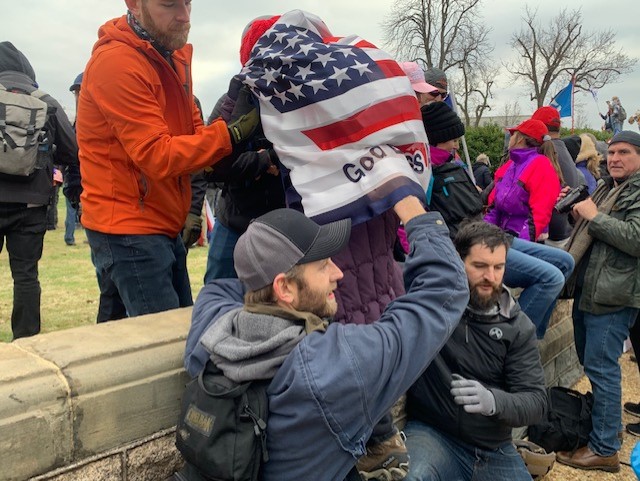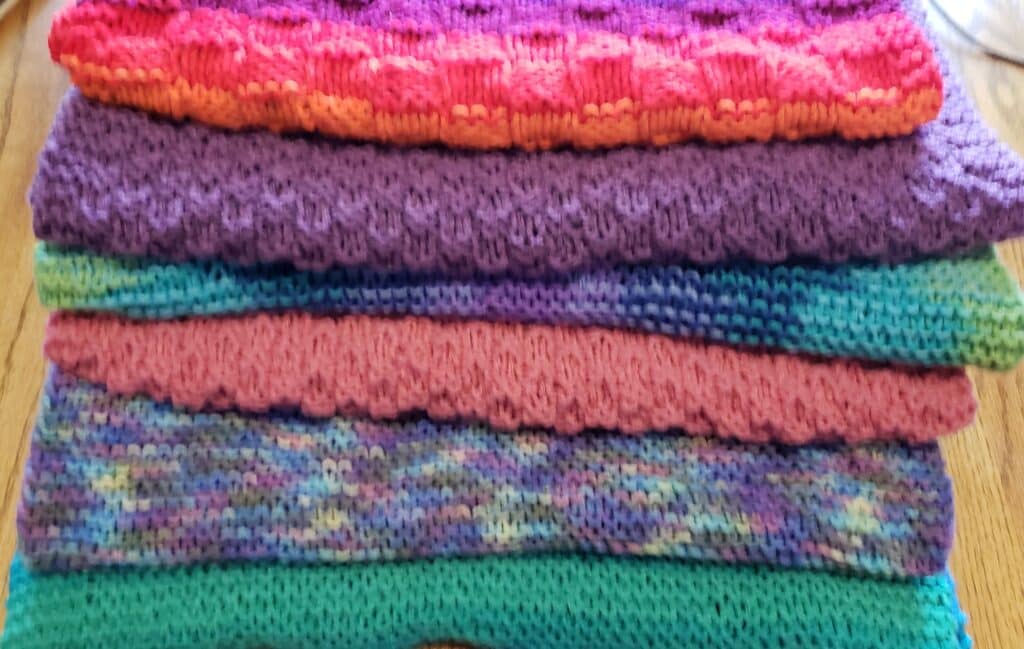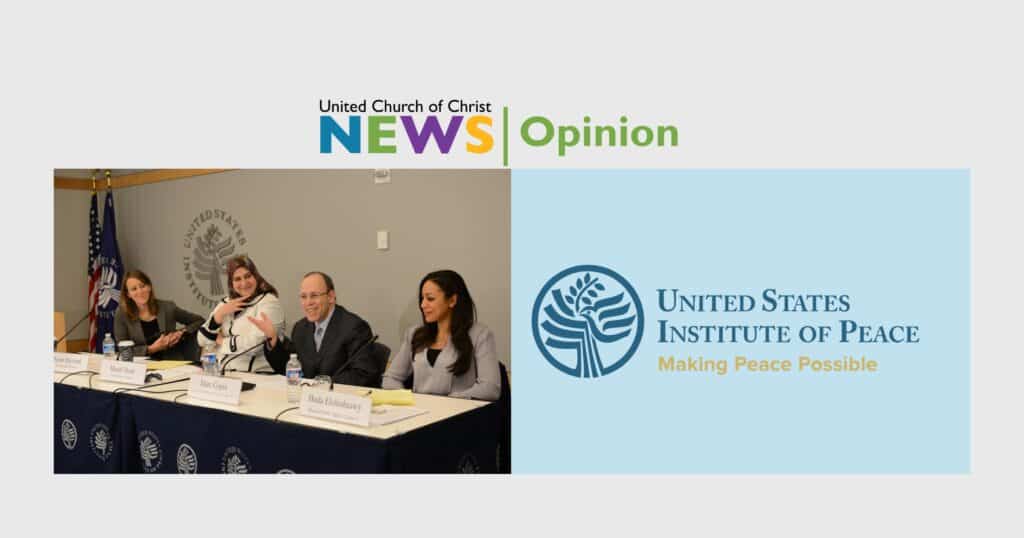Amid pre-inauguration turmoil, UCC leaders suggest do’s, don’ts
With a historic second impeachment of President Trump, security concerns around the upcoming inauguration of the incoming president, Joseph Biden Jr., and FBI reports of potential protests in state capitals around the country, how does the church respond?
UCC leaders, clergy and advocates offer both pastoral and practical ways to deal with the political turmoil.
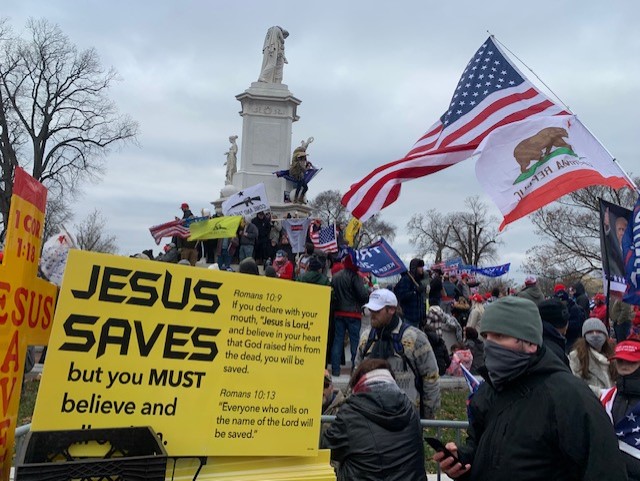
“I see two primary tasks for the Church, one prophetic and one pastoral. The first is to call out and name the persistent evil that is white supremacy,” said the Rev. John Dorhauer, UCC general minister and president. “It is gaining purchase with increasingly more of our citizens and it will only be held in check when good people name it for what it is and declare once and for all this is not who we choose to be.
“The second is to tend to the wounds that have been inflicted. There are calls for unity — and I am all for unity,” he continued. “But like Jeremiah once warned, we can heal a wound lightly and cry peace when there is no peace. We were all traumatized by what we witnessed in our nation’s Capitol last week. We all need to heal. We need a return to civility in our public discourse.”
Hundreds of National Guard troops are patrolling the U.S. Capitol area, after the FBI warned of threats and possible demonstrations leading into inauguration week. The Bureau has said state legislatures are also becoming targets for protesters, with actions planned for Jan. 17.
Against Christian nationalism
Sandy Sorensen, director of the UCC Washington, D.C., office, concerned about people’s safety, said there are a number of actions people can take in the week leading up to the inauguration without leaving home.
She was in the office just across the street when protestors stormed the Capitol on Jan. 6. She saw demonstrators handing out Bibles and offering Bible study guides to justify their actions.
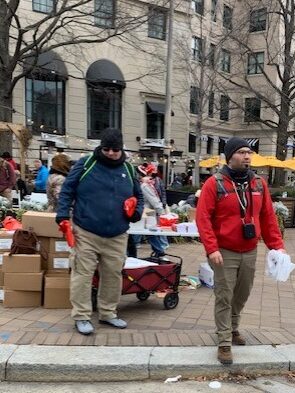
One of the responses she pointed to involves taking a stand against white Christian nationalism. The UCC is coordinating a response with longtime coalition partners at the Baptist Joint Committee for Religious Liberty, and asking advocates to sign on.
“We must stand up to and speak out against Christian nationalism, especially when it inspires acts of violence and intimidation — including vandalism, bomb threats, arson, hate crimes, and attacks on houses of worship — against religious communities at home and abroad,” the statement reads. “Whether we worship at a church, mosque, synagogue, or temple, America has no second-class faiths. All are equal under the U.S. Constitution. As Christians, we must speak in one voice condemning Christian nationalism as a distortion of the gospel of Jesus and a threat to American democracy.”
Support new legislation
Sorensen also encourages support for new legislation, which she called “an important first step toward fixing what’s broken in our democracy.” HR 1, the For the People Act, is a comprehensive measure to bring about needed democracy reforms. The legislation includes ways to:
- Expand and protect voting rights and access to the ballot.
- Put ordinary Americans ahead of big money donors.
- End gerrymandering so that electoral districts are fairly drawn.
- Hold elected officials to the highest ethical standards.
The Declaration for American Democracy is offering a number of actions one can take to support the For the People Act here.
Faith in Public Life is offering training for faith leaders that will offer clergy concrete steps they can take to lead congregations in this uncertain time. Interested parties can register here for a Jan 14. webinar that will be held from 7 to 8:30 p.m. ET.
Other clergy around the country advise reaching out to like-minded faith communities in local areas to build bridges, uniting to focus on what can be done to promote a vibrant democracy where you live and serve.
Speaking out locally
“Repeated lying in our public discourse from politicians and sadly other public officials, including clergy, has gone unchecked far too long. The lying facilitated violence, sedition and insurrection,” said the Rev. Peter Cook, UCC minister and executive director of the New York Council of Churches. “As pastors we need to be brave and be true in our speech and create environments in our faith communities and the public square, which facilitates truth telling. Building relationships with others and seeking truth by venturing tough conversations is important. The church must stop trying to be ‘apolitical’ or engage in silencing the voice of others who are struggling in the congregation or community. Instead, create space to discuss tough things.”
“I would warn us from using words that create more division then unity. I think the double standard that is being displayed in this nation’s political parties is what has irritated so many people, including me,” said Greg Denk, the UCC’s disaster coordinator for the Indiana-Kentucky Conference. “My personal recommendation is let us not return evil with evil but with good, including our words.”
Sorensen said many D.C. congregations are planning to have a unified sign message, “Our Witness Remains: Black Lives Matter,” at their houses of worship next week.
She is also noting the importance of sharing the message. “I would encourage people not to overlook the power of media advocacy, especially with local and regional media outlets. Letters to the editor, op-ed campaigns, radio and television can really help to shift the public narrative and dismantle misinformation and disinformation.”
The 59th Presidential Inaugural Committee suggests a day of service on MLK Day, Monday, Jan. 18, and is partnering with groups across the country to host service events that focus on COVID-19 relief and challenges the pandemic has made more difficult.
The Committee plans a memorial to remember and honor the lives lost to COVID-19 in cities and towns across the country on Tuesday, Jan. 19, at 5:30 p.m. ET. A D.C. ceremony will feature lighting around the Lincoln Memorial Reflecting Pool. Communities and congregations are invited to join by illuminating buildings and ringing church bells at 5:30 p.m. ET Tuesday in a national moment of unity and remembrance.
Avoiding physical confrontations
On Wednesday, Jan. 20, when Joe Biden and Kamala Harris are sworn in at the U.S. Capitol as president and vice president, it will be inside a secure perimeter. On the National Mall, nearly 200,000 American flags will be planted to represent the American people.
The UCC and The People’s Inauguration are offering a pre-inaugural worship service on Tuesday, Jan. 19. “Building Back Hope: A Service of Release & Renewal,” at 3:30 p.m. ET, features a number of UCC preachers coming together in prayer to bear witness to the past year and pouring hope into the future. Interested participants can register here.
For those experiencing emotional distress triggered by the turmoil the nation is embroiled in, there is help. The Substance Abuse and Mental Health Services Administration Helpline, 1-800-985-5990, is a 24/7, 365-day-a-year, national hotline dedicated to providing immediate crisis counseling for people who are experiencing emotional distress related to any natural or human-caused disaster. The Disaster Distress Helpline also answers calls and texts related to infectious disease outbreaks, such as the COVID pandemic, incidents of community unrest and other traumatic events.
Finally, a word of advice from the Rev. Jerry Foltz, a 77-year-old retired pastor, a tireless UCC advocate and a volunteer with 20 years in the UCC Disaster Ministries Network.
“I plead with you NOT to get involved in these threatened actions, neither in support nor in countering them,” said Foltz, pastor emeritus of Wellspring UCC, Centerville, Va. “Additional people other than law enforcement and military will make the incidents worse. And you could be hurt in the worst way. I urge you not to engage strangers who have strong opinions; we don’t always know what will set people off with one more challenge to their opinion right now. I have demonstrated in the past for civil rights and against some wars, peacefully. But now is not the time to show up at any of these unpredictable events. It is best to stay home. Don’t go out, don’t risk more exposure to COVID-19. We will have plenty of work after Jan. 20 to try to rebuild our national life, with mighty prayers.”
Related News
Send a prayer shawl along to General Synod 35
There’s been a buzz about Missouri, Kansas – can you hear it? It’s more of a clicking...
Read MoreOpinion: UCC pastor and former Institute of Peace Staffer calls for action in defense of peace
Editor’s Note: The United States Institute of Peace (USIP), an independent institute founded...
Read MorePension Boards appoints David A. Klassen as its President, CEO
The Pension Boards, an affiliated ministry of the United Church of Christ recently announced its...
Read More
